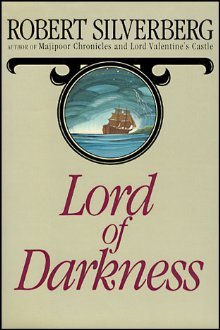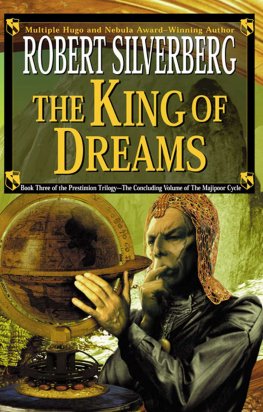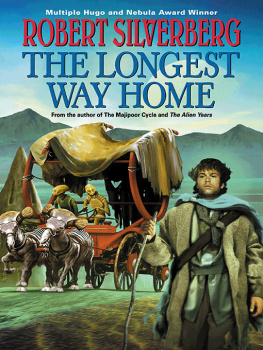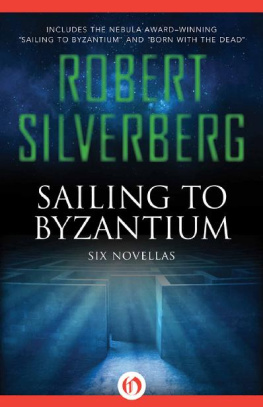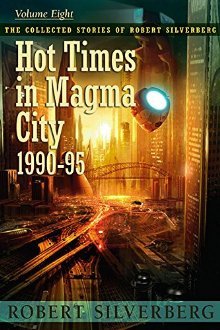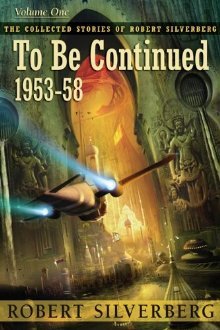Robert Silverberg - Sailing to Byzantium
Here you can read online Robert Silverberg - Sailing to Byzantium full text of the book (entire story) in english for free. Download pdf and epub, get meaning, cover and reviews about this ebook. year: 2011, publisher: Subterranean Press, genre: Science fiction. Description of the work, (preface) as well as reviews are available. Best literature library LitArk.com created for fans of good reading and offers a wide selection of genres:
Romance novel
Science fiction
Adventure
Detective
Science
History
Home and family
Prose
Art
Politics
Computer
Non-fiction
Religion
Business
Children
Humor
Choose a favorite category and find really read worthwhile books. Enjoy immersion in the world of imagination, feel the emotions of the characters or learn something new for yourself, make an fascinating discovery.
- Book:Sailing to Byzantium
- Author:
- Publisher:Subterranean Press
- Genre:
- Year:2011
- ISBN:978-1-59606-402-7
- Rating:5 / 5
- Favourites:Add to favourites
- Your mark:
- 100
- 1
- 2
- 3
- 4
- 5
Sailing to Byzantium: summary, description and annotation
We offer to read an annotation, description, summary or preface (depends on what the author of the book "Sailing to Byzantium" wrote himself). If you haven't found the necessary information about the book — write in the comments, we will try to find it.
Sailing to Byzantium — read online for free the complete book (whole text) full work
Below is the text of the book, divided by pages. System saving the place of the last page read, allows you to conveniently read the book "Sailing to Byzantium" online for free, without having to search again every time where you left off. Put a bookmark, and you can go to the page where you finished reading at any time.
Font size:
Interval:
Bookmark:
Sailing to Byzantium
by Robert Silverberg
At dawn he arose and stepped out onto the patio for his first look at Alexandria, the one city he had not yet seen. That year the five cities were Changan, Asgard, New Chicago, Timbuctoo, Alexandria: the usual mix of eras, cultures, realities. He and Gioia, making the long flight from Asgard in the distant north the night before, had arrived late, well after sundown, and had gone straight to bed. Now, by the gentle apricot-hued morning light, the fierce spires and battlements of Asgard seemed merely something he had dreamed.
The rumor was that Asgards moment was finished anyway. In a little while, he had heard, they were going to tear it down and replace it, elsewhere, with Mohenjo-daro. Though there were never more than five cities, they changed constantly. He could remember a time when they had had Rome of the Caesars instead of Chang-an, and Rio de Janeiro rather than Alexandria. These people saw no point in keeping anything very long.
It was not easy for him to adjust to the sultry intensity of Alexandria after the frozen splendors of Asgard. The wind, coming off the water, was brisk and torrid both at once. Soft turquoise wavelets lapped at the jetties. Strong presences assailed his senses: the hot heavy sky, the stinging scent of the red lowland sand borne on the breeze, the sullen swampy aroma of the nearby sea. Everything trembled and glimmered in the early light. Their hotel was beautifully situated, high on the northern slope of the huge artificial mound known as the Paneium that was sacred to the goat-footed god. From here they had a total view of the city: the wide noble boulevards, the soaring obelisks and monuments, the palace of Hadrian just below the hill, the stately and awesome Library, the temple of Poseidon, the teeming marketplace, the royal lodge that Marc Antony had built after his defeat at Actium. And of course the Lighthouse, the wondrous many-windowed Lighthouse, the seventh wonder of the world, that immense pile of marble and limestone and reddish-purple Aswan granite rising in majesty at the end of its mile-long causeway. Black smoke from the beacon fire at its summit curled lazily into the sky. The city was awakening. Some temporaries in short white kilts appeared and began to trim the dense dark hedges that bordered the great public buildings. A few citizens wearing loose robes of vaguely Grecian style were strolling in the streets.
There were ghosts and chimeras and phantasies everywhere about. Two slim elegant centaurs, a male and a female, grazed on the hillside. A burly thick-thighed swordsman appeared on the porch of the temple of Poseidon holding a Gorgons severed head and waved it in a wide arc, grinning broadly. In the street below the hotel gate three small pink sphinxes, no bigger than housecats, stretched and yawned and began to prowl the curbside. A larger one, lion-sized, watched warily from an alleyway: their mother, surely. Even at this distance he could hear her loud purring.
Shading his eyes, he peered far out past the Lighthouse and across the water. He hoped to see the dim shores of Crete or Cyprus to the north, or perhaps the great dark curve of Anatolia. Carry me toward that great Byzantium, he thought. Where all is ancient, singing at the oars. But he beheld only the endless empty sea, sun-bright and blinding though the morning was just beginning. Nothing was ever where he expected it to be. The continents did not seem to be in their proper places any longer. Gioia, taking him aloft long ago in her little flitterflitter, had shown him that. The tip of South America was canted far out into the Pacific; Africa was weirdly foreshortened; a broad tongue of ocean separated Europe and Asia. Australia did not appear to exist at all. Perhaps they had dug it up and used it for other things. There was no trace of the world he once had known. This was the fiftieth century. The fiftieth century after what? he had asked several times, but no one seemed to know, or else they did not care to say.
Is Alexandria very beautiful? Gioia called from within.
Come out and see.
Naked and sleepy-looking, she padded out onto the white-tiled patio and nestled up beside him. She fit neatly under his arm. Oh, yes, yes! she said softly. So very beautiful, isnt it? Look, there, the palaces, the Library, the Lighthouse! Where will we go first? The Lighthouse, I think. Yes? And then the marketplaceI want to see the Egyptian magiciansand the stadium, the raceswill they be having races today, do you think? Oh, Charles, I want to see everything!
Everything? All on the first day?
All on the first day, yes, she said. Everything.
But we have plenty of time, Gioia.
Do we?
He smiled and drew her tight against his side.
Time enough, he said gently.
He loved her for her impatience, for her bright bubbling eagerness. Gioia was not much like the rest in that regard, though she seemed identical in all other ways. She was short, supple, slender, dark-eyed, olive-skinned, narrow-hipped, with wide shoulders and flat muscles. They were all like that, each one indistinguishable from the rest, like a horde of millions of brothers and sistersa world of small lithe childlike Mediterraneans, built for juggling, for bull-dancing, for sweet white wine at midday and rough red wine at night. They had the same slim bodies, the same broad mouths, the same great glossy eyes. He had never seen anyone who appeared to be younger than twelve or older than twenty. Gioia was somehow a little different, although he did not quite know how; but he knew that it was for that imperceptible but significant difference that he loved her. And probably that was why she loved him also.
He let his gaze drift from west to east, from the Gate of the Moon down broad Canopus Street and out to the harbor, and off to the tomb of Cleopatra at the tip of long slender Cape Lochias. Everything was here and all of it perfect, the obelisks, the statues and marble colonnades, the courtyards and shrines and groves, great Alexander himself in his coffin of crystal and gold: a splendid gleaming pagan city. But there were odditiesan unmistakable mosque near the public gardens, and what seemed to be a Christian church not far from the Library. And those ships in the harbor, with all those red sails and bristling mastssurely they were medieval, and late medieval at that. He had seen such anachronisms in other places before. Doubtless these people found them amusing. Life was a game for them. They played at it unceasingly. Rome, Alexandria, Timbuctoowhy not? Create an Asgard of translucent bridges and shimmering ice-girt palaces, then grow weary of it and take it away? Replace it with Mohenjo-daro? Why not? It seemed to him a great pity to destroy those lofty Nordic feasting halls for the sake of building a squat brutal sun-baked city of brown brick; but these people did not look at things the way he did. Their cities were only temporary. Someone in Asgard had said that Timbuctoo would be the next to go, with Byzantium rising in its place. Well, why not? Why not? They could have anything they liked. This was the fiftieth century, after all. The only rule was that there could be no more than five cities at once. Limits, Gioia had informed him solemnly when they first began to travel together, are very important. But she did not know why, or did not care to say.
He stared out once more toward the sea.
He imagined a newborn city congealing suddenly out of mists, far across the water: shining towers, great domed palaces, golden mosaics. That would be no great effort for them. They could just summon it forth whole out of time, the Emperor on his throne and the Emperors drunken soldiery roistering in the streets, the brazen clangor of the cathedral gong rolling through the Grand Bazaar, dolphins leaping beyond the shoreside pavilions. Why not? They had Timbuctoo. They had Alexandria. Do you crave Constantinople? Then behold Constantinople! Or Avalon, or Lyonesse, or Atlantis. They could have anything they liked. It is pure Schopenhauer here: the world as will and imagination. Yes! These slender dark-eyed people journeying tirelessly from miracle to miracle. Why not Byzantium next? Yes! Why not?
Font size:
Interval:
Bookmark:
Similar books «Sailing to Byzantium»
Look at similar books to Sailing to Byzantium. We have selected literature similar in name and meaning in the hope of providing readers with more options to find new, interesting, not yet read works.
Discussion, reviews of the book Sailing to Byzantium and just readers' own opinions. Leave your comments, write what you think about the work, its meaning or the main characters. Specify what exactly you liked and what you didn't like, and why you think so.


